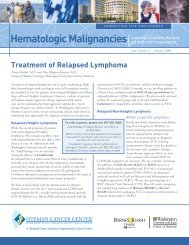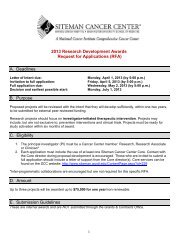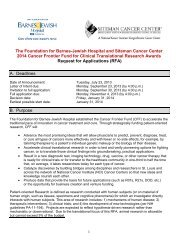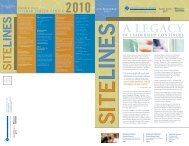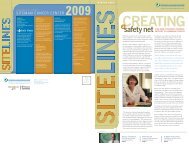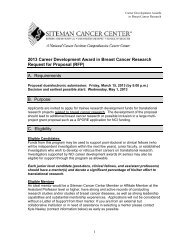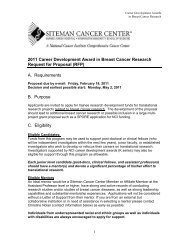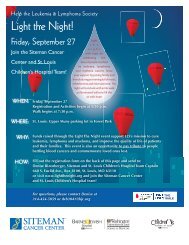Annual Report to Stakeholders 2011-2012 - Siteman Cancer Center ...
Annual Report to Stakeholders 2011-2012 - Siteman Cancer Center ...
Annual Report to Stakeholders 2011-2012 - Siteman Cancer Center ...
You also want an ePaper? Increase the reach of your titles
YUMPU automatically turns print PDFs into web optimized ePapers that Google loves.
Program for the Elimination of <strong>Cancer</strong> Disparities (PECaD)<br />
5000 run/walk hosted by the local Gateway Chapter of the Colon <strong>Cancer</strong> Alliance.<br />
Some members, such as Yolanda Austin whose close friend died of colon cancer, hit<br />
the pavement <strong>to</strong> spread the word about the importance of screening for prevention<br />
and early detection. The group is also working <strong>to</strong> identify resources for colorectal<br />
cancer and, with providers and community members, <strong>to</strong> raise awareness of pathways<br />
<strong>to</strong> such resources. Finally, the group continues <strong>to</strong> provide input, as needed, <strong>to</strong><br />
PECaD’s main research study, the randomized control trial led by Dr. Aimee James.<br />
Prostate <strong>Cancer</strong> Community Partnership<br />
The Prostate <strong>Cancer</strong> Community Partnership continued its goal <strong>to</strong> reduce disparities<br />
in prostate cancer outcomes, especially among African Americans who experience<br />
the heaviest burden from the disease. The group was also actively involved in<br />
PECaD’s pilot project (2010-<strong>2012</strong>) <strong>to</strong> assess barriers <strong>to</strong> minority participation in<br />
tissue research. For this project, partnership members provided direction <strong>to</strong> help plan<br />
recruitment and project implementation strategies; some members even helped<br />
review and code de-identified focus group transcripts. The group has focused some<br />
discussion on the new U.S. Preventative Services Task Force recommendations for<br />
prostate cancer screening with the PSA blood test. Physician experts provided<br />
members with their insights about the guidelines and what they mean for groups at<br />
high risk of developing prostate cancer. The members drafted a response from the<br />
partnership, which was disseminated in the January <strong>2012</strong> PECaD newsletter. Faculty<br />
and staff in the partnership have also led the development of an evaluation project <strong>to</strong><br />
understand the screening-related follow-up activities of men that have participated in<br />
community prostate cancer screening events.<br />
12



